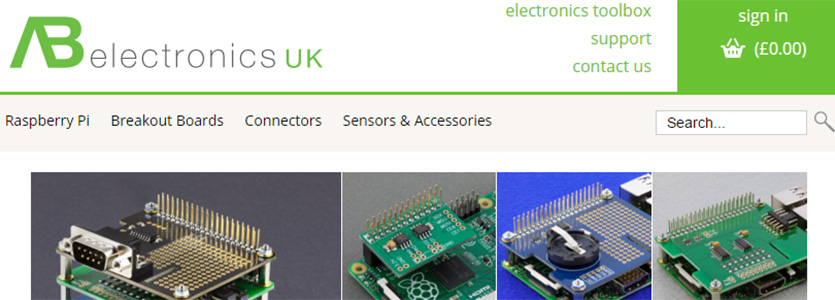
When we launched our e-commerce shop AB Electronics UK selling the Raspberry Pi development boards which myself and my brother Andrew have designed and hand built we thought that we knew all the potential issues and pitfalls of e-commerce as we had spent many years (since 1998) building and maintaining over 80 e-commerce websites for our customers as part of our Apexweb web design business and had assisted our web clients with the running of their online businesses. Almost all of the e-commerce websites we had developed in the past for clients were for businesses that used a drop shipping business model and so didn’t have their own stock to hold and deal with stock control and their own shipping costs as these were being handled by their dropshipping suppliers.
Setting up AB Electronics UK meant that we needed to also deal with part and component suppliers from many countries, direct mailing costs, packaging, manufacture and testing of all the products in addition to writing code libraries for each board.
What we didn’t appreciate was the amount of non-online support, equipment & supplies needed!
Since the launch of our own shop in September 2012, we have sent out over 6000 orders to more than 75 countries to every continent (apart from Antarctica!)
Boxes and Packing
The first issue which arose after sending out our first orders was the need for much stronger packaging materials and boxes after the first few parcels had been damaged in the single wall boxes we initially used in the postal system.
We found a much better supplier of double-walled cardboard boxes from stampbourne.com which we continue to use. They also supply us with packing tape and packing material for the parcels.
We started with two sizes of boxes for the parcels but we soon needed to include larger size boxes for bigger orders and we now have 4 different box sizes to use for all sizes of orders.
Postage Costs
We also didn’t appreciate the cost of other postal items such as parcel tape and labels, we initially used the online postage service from the Royal Mail in the UK and their online service provides PDF labels which are pre-paid and can be fixed onto each parcel meaning that they can just be handed over at the post office without having to queue up and pay for the postage with the post office counter which took a lot of time the first couple of months and upset all the people waiting to send a single parcel behind us! The Royal Mail pre-paid labels used Avery labels which worked out to be very expensive to continue to use.
We moved to a new Royal Mail service supplied called Drop and Go by our main local post office last year which allows us to pre-pay into a postage account with them and we only have to drop off the parcels with the destination address label, return address and air mail label if needed and the post office staff weight and print each postal label. This has allowed us to reduce the postage cost on each order for overseas orders as the costs for the pre-paid system are lower than the previous online service we had used before. We now use a Dymo Labelwriter 450 printer with the labels supplied by Amazon UK which are much cheaper to run and the labels stick very well on the parcels.
We found that some country's postal systems are not as reliable or careful with parcels as we hoped and due to very high damage or parcel loss rates we had to remove a number of delivery destinations from our shop due to the large losses we incurred with parcels either going missing or arriving so badly damaged that the boards inside had been crushed or broken.
We had several customers in Italy send us photos of the damage to their parcels with footprints on the boxes so they had been trodden on crushing the content!
Postal Address fun!
In the past, all the other e-commerce websites we had worked on for our web design clients had nearly all only sent to addresses in the United Kingdom and didn’t have to deal with the different postal rates and address formats with international destinations.
As we designed our e-commerce system ourselves we have been able to write a bespoke version for our own shop with full international support and this version has also been used now on newer e-commerce sites for clients including one for the German market that had to be completely translated from English to German which was a very interesting project.
Our e-commerce system now has custom postal address formatters for all the destinations we send to and only occasionally have issues when a customer enters their entire address on a single line rather than using all the address boxes provided on the checkout but we contact the customer before sending their parcel to confirm the correct address.
We very occasionally have a parcel returned due to the customer entering an incorrect postal address and we resend if they can give us the correct address or refund the orders if they don’t get back to us.
International Language and Online Support
Whilst all of our previous website clients had been either in the United Kingdom or in the USA we didn’t have any language issues with technical support but as soon as we started selling our products online we quickly found that tech support questions would be sent via our contact form in the customer’s local language but luckily Google Translate came to the rescue and we still use this with non-English questions with very good results.
Earlier in 2015, we launched a combined Knowledge Base https://www.abelectronics.co.uk/kb/knowledgebase and Community Forum https://www.abelectronics.co.uk/forums/ which allows customers to post their questions online and we can normally respond to their questions within a few hours. The forums have proved to be very popular and the knowledge base pages have many hundreds of visitors every day in addition to support pages for our own product we also include pages for general Raspberry Pi support with setting up things like networking, I2C, SPI, etc which are very popular.
Since the launch of the knowledge base system, the number of email enquiries for the subjects covered online has dropped significantly.
The knowledge base has also allowed us to easily add more tutorials in sections for each development board.
Since our launch, we have expanded our product range from the initial ADC Pi board to over 40 development boards, accessories and connectors for the Raspberry Pi and Arduino platforms. All of our Raspberry Pi boards are still assembled in our workshop in the loft space of our home and we have progressed from placing each of the surface mount parts by hand with tweezers to being automatically placed using our DIY Pick and Place machine.
Finances and Taxes
For the first year of selling online our sales hadn’t exceeded the UK VAT threshold and so we could sell everything at a flat rate and we didn’t need to add UK VAT to the cost of the item in the second year, we had to register for VAT in the UK which meant that we needed some major changes to our e-commerce system to deal with VAT for both UK and European customers and VAT exemption for EU businesses and all other countries. For European businesses, there is a business VAT checking system called VIES which has an API which we could be integrated with our checkout pages to check that any European business who entered their VAT/TAX number could be validated before the VAT was removed from their order totals.
The UK tax office has very heavy penalties for VAT fraud and so it was very important for us to check all the VAT numbers entered by our customers!
Luckily we don’t have to deal with the complex tax system in the USA with each state having their own tax rules and rates as everything to the USA is sent excluding VAT.
Web Development
In the past 3 years, our website development business has been taken over by electronics sales and our online sales now account for over 95% of our annual income but the 5% income for website work still seems to take over 30% of our time!
Our website work had been slowly declining in the previous few years and a large number of other web design agencies had appeared in the local area as well which seem to have taken a lot of the accommodation website work which had been a big part of our design business for many years, and with the decline in online photographic stock sales with iStockPhoto and other agencies we used, the launch of our own e-commerce shop came along at a good time.
Our first big website which is a local tourism guide called Virtual Swanage (https://www.virtual-swanage.co.uk) was launched in 1996 as a hobby and to learn about websites (2 years before Apexweb started) and will be 20 years old next spring. The first version of the site with only five pages was designed on a Commodore Amiga and uploaded on a 1200 baud modem. The site has now grown to several thousand pages with information for both tourists and locals.
We are continuing to maintain our existing web client’s websites but due to the amount of time we are spending on our e-commerce business we are not taking on new website work for the foreseeable future and we are recommending other local web designers who we have worked with in the past and trust to do a good job for any new web enquires.
I have had comments from some of our web design customers that they heard we have closed the design business but they can be assured that it is still running and we are continuing to maintain and update their websites when needed.
The Future Plans
We are continuing to develop new Raspberry Pi development boards and have several new boards under development, with the launch of the Raspberry Pi Zero earlier this week we are looking into selling a selection of our boards in “kit” format where the customers can solder the headers if needed themselves.
We would also like to be able to buy a workshop in our local area but the costs to buy and equip a workshop for larger-scale electronics production are very high and we will need to save for a few years to be able to go ahead with these expansion plans. We have considered renting workshop space in a local business park but the leases are very short and expensive and we wouldn’t be able to add the modifications to the building needed for fume extraction systems.
We would appreciate any feedback for new development boards in the comments below or send me an email via the contact form on the blog.
Myself and Andrew would like to thank all our customers who have purchased our Raspberry Pi development boards in our first three years of trading and we look forward to many more years designing and selling electronics products for the maker and hobby market.


Comments